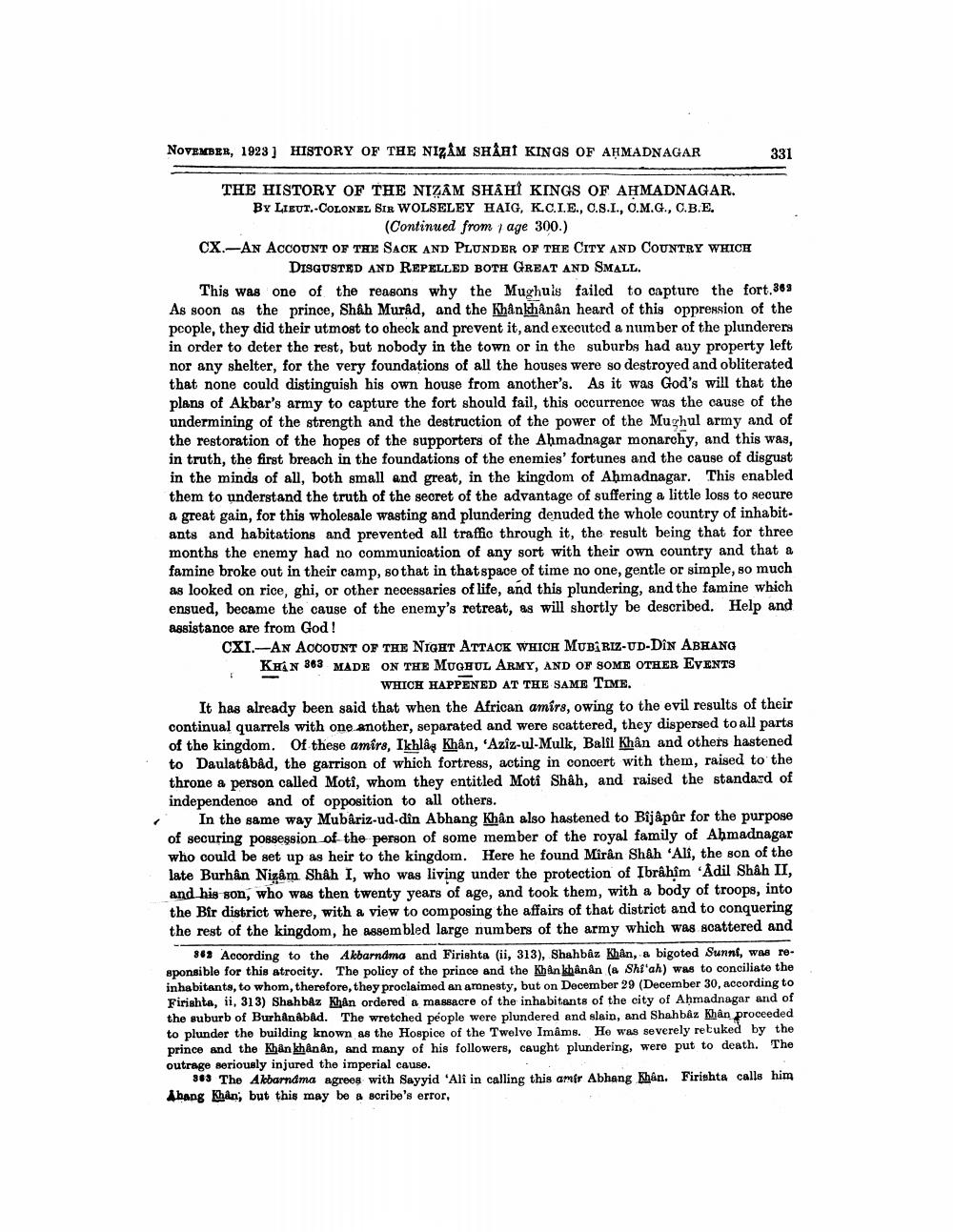________________
NOVEMBER, 1923] HISTORY OF THE NIZAM SHAH KINGS OF AHMADNAGAR
331
THE HISTORY OF THE NIZAM SHAH KINGS OF AHMADNAGAR. BY LIEUT.-COLONEL BIR WOLSELEY HAIG, K.C.I.E., O.S.I., O.M.G., C.B.E.
(Continued from 1 age 300.) cx.-AN ACCOUNT OF THE SACK AND PLUNDER OF THE CITY AND COUNTRY WHICH
DISGUSTED AND REPELLED BOTH GREAT AND SMALL. This was one of the reasons why the Mughuis failed to capture the fort.369 As soon as the prince, Shih Murad, and the Khânkhânån heard of this oppression of the people, they did their utmost to check and prevent it, and executed a number of the plunderers in order to deter the rest, but nobody in the town or in the suburbs had any property left nor any shelter, for the very foundations of all the houses were so destroyed and obliterated that none could distinguish his own house from another's. As it was God's will that the plans of Akbar's army to capture the fort should fail, this occurrence was the cause of the undermining of the strength and the destruction of the power of the Mughul army and of the restoration of the hopes of the supporters of the Ahmadnagar monarchy, and this was, in truth, the first breach in the foundations of the enemies' fortunes and the cause of disgust in the minds of all, both small and great, in the kingdom of Aḥmadnagar. This enabled them to understand the truth of the secret of the advantage of suffering a little loss to secure a great gain, for this wholesale wasting and plundering denuded the whole country of inhabit. ants and habitations and prevented all traffic through it, the result being that for three months the enemy had no communication of any sort with their own country and that a famine broke out in their camp, so that in thatspace of time no one, gentle or simple, so much as looked on rice, ghi, or other necessaries of life, and this plundering, and the famine which ensued, became the cause of the enemy's retreat, as will shortly be described. Help and assistance are from God!
CXI.-AN ACCOUNT OF THE NIGHT ATTACK WHICH MUBARIZ-UD-Din ABHANG KAN 363 MADE ON THE MUGHUL ARMY, AND OF SOME OTHER EVENTS
WHICH HAPPENED AT THE SAME TIME. It has already been said that when the African amirs, owing to the evil results of their continual quarrels with one another, separated and were scattered, they dispersed to all parts of the kingdom. Of these amirs, Ikhlág Khân, 'Aziz-ul-Mulk, Balil Khan and others hastened to Daulatábåd, the garrison of which fortress, acting in concert with them, raised to the throne a person called Moti, whom they entitled Moti Shah, and raised the standard of
independence and of opposition to all others. . In the same way Mubariz-ud-din Abhang Khân also hastened to Bijapûr for the purpose
of securing possession of the person of some member of the royal family of Ahmadnagar who could be set up as heir to the kingdom. Here he found Mîrân Shah 'Ali, the son of the late Burhan Nizâm Shah I, who was living under the protection of Ibrahim Adil Shah II, and his son, who was then twenty years of age, and took them, with a body of troops, into the Bir district where, with a view to composing the affairs of that district and to conquering the rest of the kingdom, he assembled large numbers of the army which was scattered and
863 According to the Akbarndma and Firishta (ii, 313), Shahbaz Khân, a bigoted Sunnt, was responsible for this atrocity. The policy of the prince and the Kh An Khanan (a Shi'ah) was to conciliate the inhabitants, to whom, therefore, they proclaimed an amnesty, but on December 29 (December 30, according to Firishta, ii, 313) Shahbaz Khan ordered a massacre of the inhabitants of the city of Ahmadnagar and of the suburb of Burhånábad. The wretched people were plundered and slain, and Shahbaz Khân proceeded to plunder the building known as the Hospice of the Twelve Imáme. He was severely rebuked by the prince and the Khân kh&nan, and many of his followers, caught plundering, were put to death. The outrage seriously injured the imperial cause.
303 The Albarndma agrees with Sayyid 'Ali in calling this amir Abhang Khan. Firishta calls him Abang Khan, but this may be a scribe's error,




